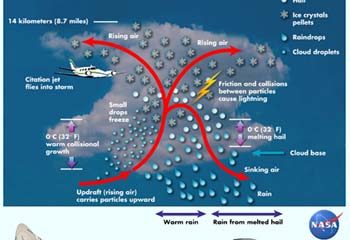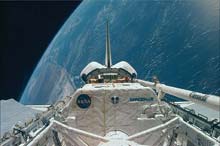Research conducted at Ohio State University suggests that cell biologists may be exposing the cell cultures they study to too much oxygen.
This finding could have broad implications for cellular biology research, which receives billions of dollars of funding nationally, said Ohio State scientist Chandan Sen. He is the lead author of a study which suggests that cells act differently depending on how much oxygen they are exposed to, especially when it is too much.
The air we br

A doctor gets a better view inside a patient by probing the body with CAT and MRI scanning equipment. Now, NASA meteorologists have done a kind of “full-body scan” of an evolving thunderstorm in the tropics, using advanced radar equipment to provide a remarkable picture of the storm’s anatomy. The observations are expected to help double-check satellite rainfall measurements, improve computer models of storms, and make the skies safer for airplanes to navigate.
David Atlas of NASA’s Goddar
Wheat growers turn to aerial imagery to overcome economic, environmental challenges
Today’s wheat growers face many economic and environmental challenges, but arguably their greatest challenge is the efficient use of fertilizer.
Growers need to apply nitrogen-based fertilizer in sufficient quantities to achieve the highest possible crop yields without over-applying – a situation that could lead to serious environmental effects. In wheat, a critical factor comes down to
Herpes viruses are notorious for their ability to hide from the immune system and establish lifelong infections. Researchers at Washington University School of Medicine in St. Louis have discovered how one mouse herpes virus escapes detection. The study appears in the January issue of the journal Immunity.
“These findings not only provide a better understanding of viral infections,” says study leader Ted H. Hansen, Ph.D., professor of genetics, “they also offer novel insights into basic cel

European scientists will be ‘turning off’ the effects of gravity during the STS-107 Space Shuttle research mission this month in order to gain a better understanding of processes in medicine, technology and science.
Their investigations will be among some 80 experiments performed during a 16-day mission in Earth orbit to be launched from Cape Canaveral tomorrow.
Seven of the 31 payloads are sponsored by ESA, and the crew will work 24 hours a day in two alternating shifts on experi
Fog-related pileups such as last month’s 71-car collision in Texas could become a thing of the past with roadside “smart beacons” that use the latest wireless technology to sense wrecks and warn motorists of danger ahead.
So say three University of Florida engineering researchers who this month applied for a patent on the concept for the beacons, which would be placed at regular intervals on roadside rights of way and would flash red or yellow lights to indicate a hazard ahead.